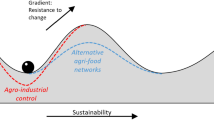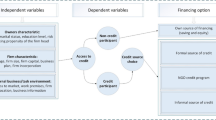Abstract
Informal Cross Border Trade (ICBT) is a viable economic activity for many people, in Zimbabwe, who have depended on it for survival during economic hardships. Due to climate change, agriculture cannot be depended upon for survival and people are increasingly depending on ICBT for a livelihood. Despite a crucial role in providing for many, ICBT has been negatively affected by changes in the fiscal economy, specifically, the adoption of virtual cash in a time of cash crisis. This paper examines the impact of the virtual cash economy on the livelihood of participants in ICBT in Gweru, Zimbabwe. Qualitative data was collected and subjected to inductive analysis. Results revealed a positive livelihood outcome for traders prior to the virtual cash economy, followed by a negative outcome when virtual cash payments increased. The paper presents a framework that highlights the importance of cash, to ensure the success and sustainability of ICBT in the city of Gweru. The paper concludes with the recommendation that ICBT should be integrated into policy to address identified issues that affect economic benefits of ICBT, to ensure its sustainability in the provision of essential livelihood needs in line with Sustainable Development Goals.

source: Authors)

source: Authors)

Similar content being viewed by others
References
Aguiar, F., & De Francisco, A. (2009). Rational choice, social identity, and beliefs about oneself. Philosophy of the Social Sciences, 39(4), 547–571
Brett, E. A. (2005). From corporatism to liberalisation in Zimbabwe: Economic policy regimes and political crisis, 1980–97. Journal of International Political Science Review, 26(1), 91–106
Campbell, E. and Crush, J. 2014. They don’t want foreigners: Zimbabwean migration and xenophobia in Botswana. Crossings: Journal of Migration and Culture,(6), 159–80.
Chikanda, A. and Tawodzera, G. 2017. Informal entrepreneurship and cross border trade between Zimbabwe and South Africa. Cape Town, South Africa and Waterloo, Ontario, Canada: South Africa Migration Programme (SAMP), International Migration Research Centre and African Centre for Cities.
Dhemba, J. (1999). Informal sector development: A strategy for alleviating urban poverty in Zimbabwe. Journal of Social Development in Africa, 14(2), 5–19
Dube, G. (2010). A study of the self-employed in the urban informal sector in Harare. A Master of Development dissertation submitted to the University of Kwazulu Natal.
Dube, G., & Casale, D. (2019). Informal sector taxes and equity: Evidence from presumptive taxation in Zimbabwe. Development Policy Review, 37(1), 47–66
Duri, F and Marongwe, N. 2017. The paradox of borders, borderlands and diasporic spaces: Contested enclaves, restrictive mechanisms and corridors of opportunity. In Mawere, M and Nhemachena, A (eds). Consumerism and the global politics of biotechnology: Rethinking food, bodies and identities in Africa’s 21st century. Langaa RPCIG. Harare
Duri, F. 2012. Antecedents and adaptations in the borderlands: A social history of informal socio-economic activities across the Rhodesia-Mozambique border with particular reference to the city of Umtali, 1900–1974. A thesis submitted to the Faculty of Humanities of the University of the Witwatersrand, Johannesburg, in fulfillment of the requirements for the degree of Doctor of Philosophy in History.
Dzawanda, B., Nicolau, M.D., Matsa, M. and Kusena, W. 2021. Livelihood outcomes of informal cross border traders prior to the rise of the virtual cash economy in Gweru, Zimbabwe. Journal of Borderlands Studies. https://doi.org/10.1080/08865655.2020.1865187.
Gardener, S. (2008). Exploring informality: An empirical analysis of the informal economy. Unpublished honours dissertation at the college of William and Mary.
Gudzinhirai, C., & Tanga, P. T. (2017). Informal entrepreneurship as a poverty alleviation mechanism in Zimbabwe: Challenges and prospects. Journal of Economics and Behavioural Studies, 9(4), 132–143
Hands, D. W. (2013). Normative rational choice theory: Past, present and future. SSRN Electronic Journal, 10(21), 1–32
Herfeld, C. (2018). From theories of human behaviour to rules of rational choice. Journal of History of Political Economy, 50(1), 1–48
Hudik, M. (2019). Two interpretations of the rational choice theory and the relevance of behavioural critique. Journal of Rationality and Society, 10(5), 114–136
Kahiya, E., & Kadirov, D. (2020). Informal cross border trade as a substratum marketing system: a review and conceptual framework. Journal of Macro Marketing, 40(1), 88–109
Kanyenze, G., Chitambara, P. and Tyson, J. 2017. The outlook of the Zimbabwean economy. Available online: https://www.odi.org/publications/10921-outlook-zimbabwean-economy(accessed on 1 November 2020).
Lovett, F. (2006). Rational choice theory and explanation. Rationality and Society, 18(2), 237–272
Maseko, N., & Manyani, O. (2011). Accounting practices of SMEs in Zimbabwe: An investigative study of record keeping for performance measurement (a case study of Bindura). Journal of Accounting and Taxation, 3(8), 171–181
Maseko, N., Manyanin, O., Chiriseri, L., Tsekea, Mugogo, P. C., Chazuza, T., & Mutengezanwa, M. (2012). An analysis of the impact of targeted government support on the SMEs growth and development in Zimbabwe: A survey of Mashonaland Central Province. Journal of Researchin International Business Management, 2(2), 51–59
Matsongoni, H., & Mutambara, E. (2018). An assessment of informal SMEs’ potential in an African economy – Theoretical and conceptual framework. Public and Municipal Finance, 7(2), 1–13
MchopaMchopa, A.D. and Jeckoniah, J.N. 2018. Sunflower and livelihood outcomes among households of smallholder farmers in Iramba District, Tanzania, in Kinyashi, G.F., Mwang’onda, E., Mandala, C.G., Hauli, E., and Mdendemi, T.R.K. (eds). Conference proceedings for an international conference on planning and development under the theme towards industrialisation in the global south: Making rural regions inclusive, held at the Institute of Rural Development Planning-Dodoma June 28–30, 2018.
Mhone, G. C. Z. (1993). The impact of structural adjustment on the urban informal sector in Zimbabwe. International Labour Organization.
Muzvidziwa, V. N. (2005). Women without borders: Informal cross-border trade among women in the Southern African Development Community Region (SADC). OSSREA Publications.
Ndiaye, T. (2008). Women informal traders: Transcending African borders: Myths, facts and ways forward. Aid-for-trade: Case story. The International Trade Centre. Southern Africa Trust: World Trade Organisation.
Ndlela, D. (2006). Informal cross-border trade. The case of Zimbabwe. Occasional paper no 52. Johannesburg: Institute for Global Dialogue.
Nshimbi, C. (2019). Life in the fringes: economic and socio-cultural practices in the Zambia–Malawi–Mozambique borderlands in comparative perspective. Journal of Borderlands Studies, 34(1), 47–70. https://doi.org/10.1080/08865655.2017.1300780
Peberdy, S., Crush, J., Tevera, D., Campbell, E., Zindela, N., Raimundo, I., Green, T., Chikanda, A., & Tawodzera, G. (2015). Transnational entrepreneurship and informal cross-border trade with South Africa. In J. Crush, A. Chikanda, & C. Skinner (Eds.), Mean streets: Migration, xenophobia and informality in South Africa. (pp. 207–228). SAMP and IDRC.
Quartz Africa. 2020. Across Africa, a reliance on the informal sector threatens effective coronavirus lockdowns. Quartz Africa. [News article] Retrieved from https://qz.com/africa/1831785/coronavirus-citizens-in-africas-informal-economy-try-to-survive/
Raftopoulos, B. (2006). The Zimbabwean crisis and the challenges for the left. Journal of Southern African Studies, 32(2), 203–209
Raftopoulos, B., Mlambo, A., & [eds]. (2009). Becoming Zimbabwe: A history from the pre-colonial period to 2008. Weaver Press.
Resnick, D. 2020. COVID-19 lockdowns threaten Africa’s vital informal urban food trade. IFPRI blog. [Blog] Retrieved from https://www.ifpri.org/blog/covid-19-lockdowns-threaten-africas-vital-informal-urban-food-trade
Sachikonye, L., Raftopoulos, B., & Kanyenze, G. (2018). Building from the rubble: The labour movement in Zimbabwe since 2000. Weaver Press.
Sibanda, B. (2019). Zimbabwe’s monetary regime and the cash crisis. Policy brief. Parliament of Zimbabwe.
Tawodzera, G. (2014). Household food insecurity and survival in Harare: 2008 and beyond. Journal of UrbanForum, 25, 207–216
Vhumbunu, R. G. (2014). An analysis of the feasibility of a cashless Zimbabwean society. A dissertation submitted in partial fulfilment of the requirements for the degree of Master of Business Administration.
Vlaev, I. (2018). Local choices: Rationality and the contextuality of decision making. Journal of Brain Science, 8(1), 1–22
Weyl, G. E. (2019). Price theory. Journal of Economic Literature, 57(2), 329–384
Zimbabwe Coalition on Debt and Development (ZIMCODD). 2016. Cash crisis, bond notes and the Zimbabwe’s economy: The real problem. Zimbabwe: Harare
Author information
Authors and Affiliations
Corresponding author
Additional information
Publisher's Note
Springer Nature remains neutral with regard to jurisdictional claims in published maps and institutional affiliations.
Rights and permissions
About this article
Cite this article
Dzawanda, B., Nicolau, M.D. & Matsa, M. Impact of Virtual Cash Economy on Livelihood Outcomes of Informal Cross Border Traders in Gweru, Zimbabwe. Urban Forum 32, 521–539 (2021). https://doi.org/10.1007/s12132-021-09428-6
Accepted:
Published:
Issue Date:
DOI: https://doi.org/10.1007/s12132-021-09428-6




